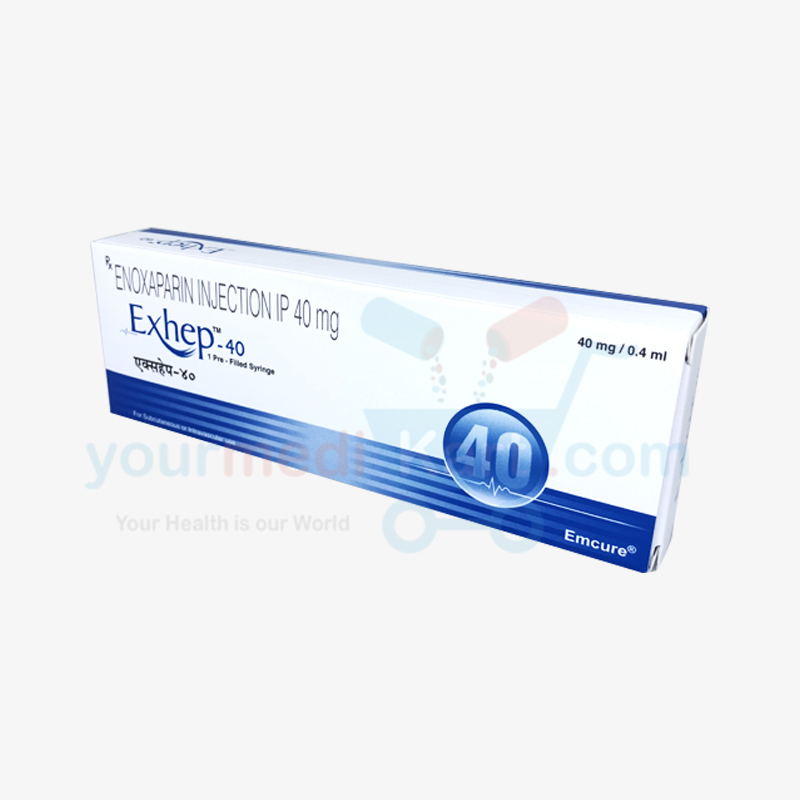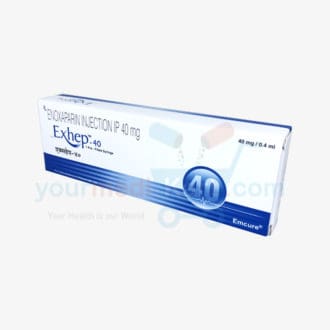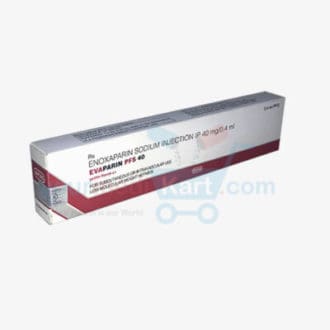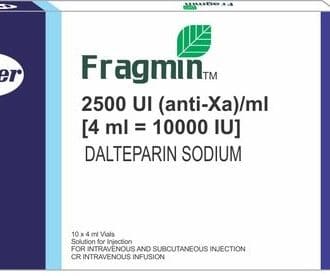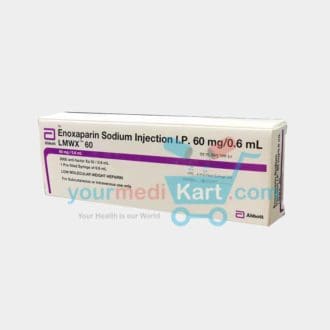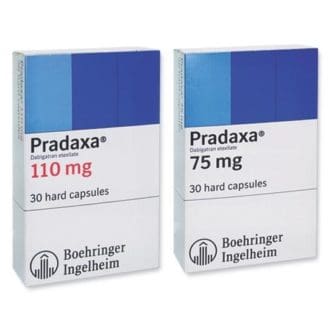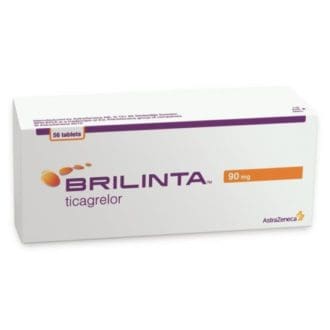Exhep Enoxaparin 40 Mg | 300 mg
Brand: Exhep
Manufacturer: Emcure Pharmaceuticals
Generic Name: Enoxaparin
Strengths Available: 40mg / 300mg
Packing: 1 Prefilled Syringe (PFS)
Form: Injectable Solution
Therapeutic Class: Anticoagulants (Low Molecular Weight Heparin – LMWH)
Exhep Injection is an anticoagulant medication used for the prevention and treatment of harmful blood clots. It contains Enoxaparin Sodium, a low molecular weight heparin (LMWH), which works by inhibiting clot formation and preventing the growth of existing clots. However, Exhep injection in IVF is often used to improve implantation rates by reducing clotting risks during early pregnancy.
Exhep 40 is a low molecular weight heparin (LMWH) that helps prevent blood clots. However, This type of thrombosis injection is widely recommended for patients with clotting disorders. One of the most common enoxaparin injection uses is to treat and prevent deep vein thrombosis and pulmonary embolism. When it comes to managing blood clot risks, injection clot therapies play a key role in patient care.
Exhep is commonly prescribed for:
-
Deep Vein Thrombosis (DVT) – blood clots in the deep veins, typically the legs
-
Pulmonary Embolism (PE) – clots that travel to the lungs
-
Post-surgical prophylaxis – especially after abdominal, hip, or knee replacement surgeries
-
Prevention of clotting during dialysis
-
Unstable angina & myocardial infarction – to reduce the risk of heart-related complications
-
Cancer-associated thrombosis – to lower clotting risk during cancer therapy

Uses of Exhep
- Exhep injection in IVF is often used to improve implantation rates by reducing clotting risks during early pregnancy. Exhep 40 is a low molecular weight heparin (LMWH) that helps prevent blood clots.
- This type of thrombosis injection is widely recommended for patients with clotting disorders. One of the most common enoxaparin injection uses is to treat and prevent deep vein thrombosis and pulmonary embolism.
- When it comes to managing blood clot risks, injection clot therapies play a key role in patient care. Exhqapjrrqa might be a miswritten or placeholder term, but it could be related to the same product or injection category.
- Exhep 40 injection uses include IVF support, prevention of clot formation, and better placental blood flow. Additionally, Streptokinase injection uses in Hindi are focused on dissolving clots in heart attack patients.
- Similarly, Tenecteplase 40 mg injection uses in Hindi relate to thrombolytic therapy in cases of acute coronary syndrome. The Exhep 40 injection use in IVF is primarily for improving uterine lining receptivity.
- The Exhep 40 injection use in pregnancy is critical for women with previous clotting complications or recurrent pregnancy loss. Moreover, Alteplase injection use in Hindi involves clot busting in emergency stroke or heart attack management.
1. Treatment and Prevention of Blood Clots
Exhep is used to treat and prevent deep vein thrombosis (DVT) — blood clots that form in the deep veins of the legs — and pulmonary embolism (PE) — when a clot travels to the lungs. These conditions can be life-threatening if left untreated.
2. Prophylaxis of Venous Thromboembolism (VTE)
This refers to preventing blood clots from forming in high-risk situations, such as:
-
After abdominal surgery
-
Following hip or knee replacement surgery
-
In individuals who are bedridden or immobile for long periods due to illness or hospitalization
3. Prevention of Clots During Dialysis
Exhep 40mg is sometimes used in patients undergoing hemodialysis to prevent clotting in the dialysis circuit and ensure smooth blood flow during the procedure.
4. Management of Acute Coronary Syndromes
It is used to manage unstable angina (chest pain due to reduced blood flow to the heart) and non-ST segment elevation myocardial infarction (NSTEMI). It helps reduce the risk of heart attack by preventing new clot formation in the coronary arteries.
5. Prevention of Clot Risk in Cancer Patients
Certain cancer treatments significantly increase the risk of venous thromboembolism. And Exhep 40mg may be prescribed to reduce the risk of blood clots during chemotherapy or in patients with active malignancy.
Exhep 40mg Injection
- Enoxaparin 40 mg injection uses is a low molecular weight heparin (LMWH) used as an anticoagulant. It contains Enoxaparin Sodium, a blood thinner that helps prevent and treat harmful blood clots in veins, lungs, or arteries.
- This injection is frequently used in hospital settings to reduce the risk of deep vein thrombosis (DVT), particularly in patients undergoing surgeries or those with limited mobility.
- It also plays a crucial role in reducing cardiac complications in patients with unstable angina and non-Q wave myocardial infarction (a type of heart attack).
- Enoxaparin 40 mg injection uses are commonly aimed at preventing blood clots and improving blood flow. The enoxaparin sodium injection IP 300 mg/3 ml formulation provides therapeutic doses for anticoagulation therapy.
- Especially in pregnancy, enoxaparin sodium injection uses in pregnancy in Hindi highlight applications such as preventing recurrent miscarriage due to clotting disorders. Similarly, evaparin 40 mg injection uses in Hindi explain its role in fertility treatments and clot prevention.
- The phrase inj enoxaparin 40 mg uses underscores its common dosage. The term exhep 300 mg injection uses in pregnancy suggests a higher-strength variant used under special medical supervision.
- When prescribing exhep 40 injection, clinicians often consider patient-specific risk profiles. The line exhep 40 injection use in pregnancy in Hindi provides localized guidance for expecting mothers.
- Another keyword, inj exhep 40, is another common reference. In fertility care, exhep 40 injection uses during pregnancy is focused on improving uteroplacental circulation.
- In Addition The variation exhep 40 mg injection denotes dosage specificity. Abbreviated terms like exhep inj or exhep injection – uses in pregnancy are also frequently used across medical texts and patient queries.
Key Indications of Exhep 40mg Injection
Exhep 40mg is used in the prevention and treatment of:
-
Deep vein thrombosis (DVT)
-
Pulmonary embolism (PE)
-
Venous thromboembolism (VTE) prophylaxis during abdominal, hip, or knee surgeries
-
Unstable angina
-
ST-segment elevation myocardial infarction (STEMI)
-
Patients with reduced mobility during acute illness
Mechanism of Action
Exhep 40mg works by binding to antithrombin III, a natural inhibitor of clotting in the body. Because This binding enhances antithrombin’s effect, particularly against Factor Xa, thereby reducing thrombin formation and ultimately preventing clot development.
Compared to unfractionated heparin, LMWH like Enoxaparin provides:
-
Greater bioavailability
-
Predictable anticoagulant response
-
Longer duration of action
-
Lower risk of osteoporosis and HIT (heparin-induced thrombocytopenia)
Who Should Avoid Exhep 40mg Injection?
Do not use if you:
-
Have active bleeding disorders
-
Are allergic to Enoxaparin, Heparin, benzyl alcohol, or pork-derived products
-
Have a history of heparin-induced thrombocytopenia (HIT)
-
Are undergoing spinal or epidural anesthesia
Use with caution if:
-
You are pregnant or breastfeeding
-
You have kidney or liver impairment
-
You are scheduled for a surgical procedure
Drug Interactions
Exhep 40mg should be used with caution if you are taking medications that increase bleeding risk. Avoid concurrent use of:
-
NSAIDs (ibuprofen, diclofenac, ketorolac)
-
Salicylates (aspirin in high doses)
-
Thrombolytic agents (alteplase, streptokinase, urokinase)
-
Other anticoagulants (warfarin, dabigatran)
-
SSRIs/SNRIs (used for depression and anxiety)
Always inform your doctor about all medications, supplements, and herbal remedies before starting Exhep 40mg.
How Exhep 40mg Injection is Administered
-
Route: Subcutaneous (under the skin), typically into the abdomen or thigh
-
Frequency: As prescribed by your doctor, often once or twice daily
-
Setting: Administered in a clinical or hospital environment, or as directed for home use with proper guidance
-
Monitoring: Platelet counts, renal function, and signs of bleeding are routinely monitored
Exhep 300mg Pen Injection 3ml
- Exhep 40 injection side effects may include mild bruising at the injection site, bleeding, or allergic reactions in rare cases. The Exhep 40 use in pregnancy is often prescribed to support healthy blood flow and prevent clotting issues in high-risk pregnancies.
- Exhep is a brand of enoxaparin, widely used as a low molecular weight heparin anticoagulant. Administering Exhep injection after embryo transfer can help improve implantation chances in IVF treatments.
- The Exhep injection uses include treatment of DVT, prevention of blood clots, and fertility support. Higher dosages like Exhep 300 mg injection are typically reserved for specific therapeutic needs.
- Fourthly The Exhep Pen 300 mg offers pre-filled convenience for patients needing self-injection. In high-risk pregnancies, Exhep 40 mg injection in pregnancy is commonly used under specialist supervision.
- Learn Exhep Pen how to use for safe and effective administration at home. Comparable products like the Evaparin 40 mg injection pen also serve similar functions in thromboprophylaxis. The Inj Exhep 60 mg dose is another variation used for moderate-risk patients, while the Exhep 60 injection offers targeted anticoagulation for specific conditions.
Key Features:
-
Form: Prefilled injection pen
-
Strength: 300mg in 3ml
-
Active Ingredient: Enoxaparin Sodium
-
Class: Anticoagulant (LMWH)
-
Route of Administration: Subcutaneous or Intravenous (only by healthcare provider)
Medical Uses of Exhep 300mg Injection
The phrase inj enoxaparin 40 mg uses underscores its common dosage. The term exhep 300 mg injection uses in pregnancy suggests a higher-strength variant used under special medical supervision. When prescribing exhep 40 injection, clinicians often consider patient-specific risk profiles. The line exhep 40 injection use in pregnancy in Hindi provides localized guidance for expecting mothers.
Another keyword, inj exhep 40, is another common reference. Although In fertility care, exhep 40 injection uses during pregnancy is focuse on improving uteroplacental circulation. However, The variation exhep 40 mg injection denotes dosage specificity. Abbreviated terms like exhep inj or exhep injection – uses in pregnancy are also frequently used across medical texts and patient queries.
This injection is commonly prescribe for:
-
Deep Vein Thrombosis (DVT)
Prevents and treats clots in the deep veins, usually in the legs, which may lead to pulmonary embolism if untreated. -
Pulmonary Embolism (PE)
A potentially life-threatening blockage in one of the pulmonary arteries caused by a blood clot. -
Post-surgical Prophylaxis
Therefore Reduces clot formation risk after surgeries such as:-
Abdominal surgery
-
Hip or knee replacement
-
Patients with limited mobility
-
-
Unstable Angina & Non-Q wave Myocardial Infarction
Reduces risk of complications in patients with acute coronary syndromes. -
ST-Segment Elevation Myocardial Infarction (STEMI)
Used with or without fibrinolytic drugs in acute heart attack treatment.
Mechanism of Action
Exhep (Enoxaparin) binds to antithrombin III, increasing its activity against Factor Xa. Morover, This inhibits the conversion of prothrombin to thrombin, preventing fibrin clot formation. Compared to standard heparin, it has:
-
Better bioavailability
-
Longer half-life
-
Predictable anticoagulant response
Precautions and Warnings
Avoid using Exhep Pen Injection if you have:
-
Active internal bleeding
-
History of Heparin-Induced Thrombocytopenia (HIT)
-
Severe allergic reactions to heparin, enoxaparin, benzyl alcohol, or pork-derived products
-
Recent or upcoming spinal/epidural procedures
Caution is advise if you have:
-
Kidney or liver disease
-
Low body weight
-
Bleeding disorders
-
Peptic ulcer disease
-
Diabetes-related eye problems
-
High blood pressure
Use in Special Populations
| Group | Advice |
|---|---|
| Pregnancy | Use only if clearly needed. May increase bleeding risk in women with prosthetic heart valves. Regular monitoring is essential. |
| Breastfeeding | Unknown if it passes into breast milk. Consult your doctor. |
| Patients | Increased risk of bleeding. Dose adjustments may need. |
| Children | Not recommended under the age of 18. |
| Surgical Patients | Avoid neuraxial/spinal anesthesia during use. |
Drug Interactions
Avoid or use cautiously with the following:
-
NSAIDs (ibuprofen, ketorolac) – increased bleeding risk
-
Aspirin – at anti-inflammatory doses
-
Thrombolytics (alteplase, streptokinase, tenecteplase)
-
Other anticoagulants (warfarin, dabigatran)
-
SSRIs or SNRIs – can increase bleeding tendency
Always inform your doctor about all medications, herbal supplements, and vitamins you’re taking.
Side Effects of Exhep Pen Injection
Common Side Effects:
-
Minor bleeding or bruising
-
Red or itchy skin
-
Headache
-
Pain or swelling at the injection site
-
Low platelet counts (thrombocytopenia)
Serious Side Effects (Seek immediate medical attention):
-
Severe allergic reactions (swelling of face, lips, tongue, difficulty breathing)
-
Excessive unexplained bleeding
-
Blood clots (chest pain, shortness of breath, leg swelling)
-
Black or bloody stools
-
Rash of dark red or purple spots under the skin
Storage Instructions
-
Store below 25°C
-
Do not freeze
-
Keep away from children
-
Protect from light and moisture
-
Use under medical supervision only
Safety and Lifestyle Tips
-
Do not stop this medication abruptly without your doctor’s advice.
-
Avoid contact sports or activities that may result in injury or bleeding.
-
Apply a cold compress to reduce injection site discomfort.
-
Limit Vitamin K-rich foods (spinach, broccoli, kale) as they can interfere with anticoagulant action.
-
Monitor platelet count and renal function regularly during treatment.
-
Avoid over-the-counter painkillers (NSAIDs) unless approved by your doctor.
Possible Side Effects
Common Side Effects
-
Mild bleeding or bruising
-
Headache
-
Red or itchy skin
-
Pain, redness, or swelling at the injection site
-
Temporary low blood cell count
-
Edema or puffiness
Serious Side Effects (Seek medical help immediately)
-
Severe allergic reactions (swelling of face/lips/tongue, difficulty breathing)
-
Excessive bleeding (dizziness, prolonged bleeding, black stools)
-
Blood clots (pain or swelling in limbs, coughing blood)
-
Purple/red rash under the skin (signs of thrombocytopenia)
Important considerations
- Bleeding Risk: As Exhep is a blood thinner, afterward it increases the risk of bleeding. Patients should be careful while shaving, using sharp objects, or engaging in activities with a higher risk of injury.
- Drug Interactions: Certain medications, such as aspirin and NSAIDs, can increase the risk of bleeding when taken with Exhep. It is crucial to inform your doctor about all the medications you are taking, including herbal supplements and vitamins.
- Medical Conditions: Patients with certain medical conditions, such as bleeding disorders, liver problems, kidney problems, high blood pressure, diabetes, or a history of stroke or brain/spinal surgery, should exercise caution and consult their doctor before using Exhep.
- Pregnancy and Breastfeeding: So, Consult your doctor before using Exhep if you are pregnant, planning to become pregnant, or breastfeeding.
Important Note
- Firstly Exhep Pen Injection should only use under strict medical supervision. It offers effective protection against life-threatening blood clots but must be administer with caution to avoid complications such as internal bleeding. Follow all instructions provided by your healthcare professional and attend all scheduled follow-up appointments for lab monitoring.
- Secondly Exhep 40 injection side effects may include mild bruising at the injection site, bleeding, or allergic reactions in rare cases. The Exhep 40 use in pregnancy is often prescribe to support healthy blood flow and prevent clotting issues in high-risk pregnancies. Afterward Exhep is a brand of enoxaparin, widely used as a low molecular weight heparin anticoagulant. Administering Exhep injection after embryo transfer can help improve implantation chances in IVF treatments.
- The Exhep injection uses include treatment of DVT, prevention of blood clots, and fertility support. Because Higher dosages like Exhep 300 mg injection are typically reserve for specific therapeutic needs.
- The Exhep Pen 300 mg offers pre-filled convenience for patients needing self-injection. In high-risk pregnancies, Moreover, Exhep 40 mg injection in pregnancy is commonly use under specialist supervision.
- Above all Learn Exhep Pen how to use for safe and effective administration at home. although Comparable products like the Evaparin 40 mg injection pen also serve similar functions in thromboprophylaxis. Doubtedly The Inj Exhep 60 mg dose is another variation use for moderate-risk patients, while the Exhep 60 injection offers targeted anticoagulation for specific conditions.
FAQ
Exhep 40 Injection is a medicine that helps prevent and treat dangerous blood clots. It works by stopping existing clots from growing and helps prevent new clots from forming. This injection is also used to stop clots in the veins, which can lead to serious conditions like deep vein thrombosis (DVT) and pulmonary embolism (PE).
This injection is an important part of the IVF process for many patients. Doctors use Enoxaparin or Heparin injections during pregnancy to treat and prevent tiny blood clots. These are blood-thinning medicines that help stop existing clots from getting bigger and help prevent new ones from forming.
Enoxaparin is safe to use during pregnancy because it does not reach the baby through the placenta. It works only in the mother's bloodstream and near the placenta. It is effective in preventing blood clots during pregnancy and may also help reduce the risk of miscarriage in women with a condition called thrombophilia, which makes them more likely to develop blood clots.
Injecting enoxaparin under the skin can cause side effects like pain and bruising where the injection is given. This pain might make some people feel anxious, scared of needles, or less trusting of doctors and nurses over time.
What is the use of Exhep injection?
What is Enoxaparin injection for IVF?
Why is enoxaparin used in pregnancy?
Is enoxaparin painful?
Does Enoxaparin cause bleeding?

